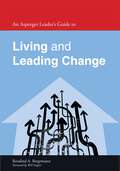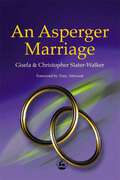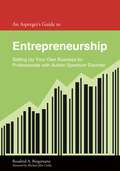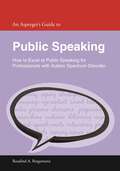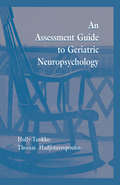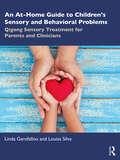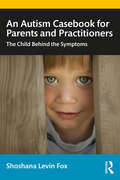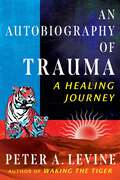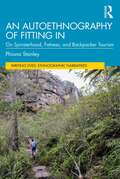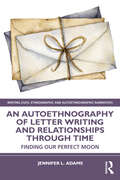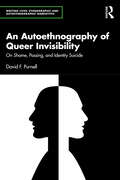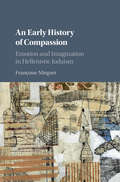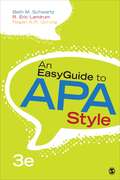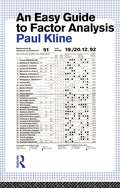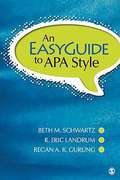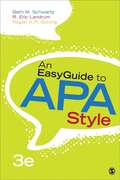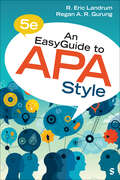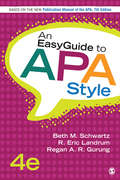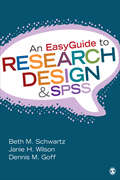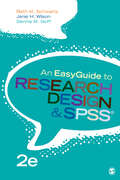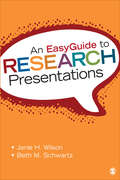- Table View
- List View
An Asperger Leader's Guide to Living and Leading Change
by Rosalind Bergemann Will NapierPeople with Asperger Syndrome (AS) often struggle with change and this is magnified when it is part of their professional role to manage and lead change. Written by a business leader with Asperger Syndrome, this practical guide provides advice and strategies for coping with and implementing change in the workplace. Combining theory and practice with case studies and hands-on tools, the book aims to help those who find change particularly difficult to overcome these challenges and use their unique talents and skills to become change champions in the workplace. The book explores the change management life cycle and how it affects leaders with AS and teaches key skills for successfully leading change, preparing staff for change, and dealing with the effects of change on the organisation as a whole. This is a vital leadership development handbook for executive-level business professionals with Asperger Syndrome as well as those who aspire to careers in these roles.
An Asperger Marriage
by Tony Attwood Gisela Slater-Walker Christopher Slater-WalkerChris and Gisela have been partners for twelve years. Four years ago Chris was diagnosed with Asperger syndrome. For Chris, this was an explanation of why he had always regarded himself as 'socially handicapped'. For Gisela, it meant coming to terms with a marriage in which there would never be an intuitive understanding despite Chris's good intentions. For the couple it was the beginning of a long and still unfinished process of learning to live with a disability regarded by some as incompatible with marriage.
An Asperger's Guide to Entrepreneurship: Setting Up Your Own Business for Professionals with Autism Spectrum Disorder
by Michael John Carley Rosalind BergemannEntrepreneurship can be an ideal career option for enterprising individuals with Asperger Syndrome (Autism Spectrum Disorder) and this detailed guide explains how to tell if being self-employed is right for you and how to go about starting and growing your own business. Written by a successful entrepreneur and business consultant with Asperger Syndrome, this book provides all the guidance you need on the practicalities of starting up a company. The unique strengths that people with Asperger Syndrome can bring to a new business venture are highlighted and solutions are offered for elements of entrepreneurship that can create stumbling blocks such as developing working relationships within your company, marketing yourself and your business, managing finances, networking and maintaining a healthy work-life balance. Full of pragmatic advice, case studies from established business owners with Asperger Syndrome and practical tools for professional development, this is an essential startup handbook for anyone on the spectrum considering making the leap to becoming an entrepreneur.
An Asperger's Guide to Public Speaking: How to Excel at Public Speaking for Professionals with Autism Spectrum Disorder
by Rosalind A. BergemannThis practical guide to effective public speaking for professionals with Asperger Syndrome (Autism Spectrum Disorder) provides tailored advice on using your Asperger strengths to your advantage and overcoming areas of challenge to find your public speaking voice. Written by a business leader with Asperger Syndrome, it includes guidance and hands-on tools for preparation, research and delivery of successful speeches and presentations. It addresses all the key areas that can cause particular difficulty for people with Asperger Syndrome such as coping with anxiety, interpreting the facial expressions of your audience, awareness of your own body language as projected to others, sensory overload issues caused by the speaking environment, and surviving post-speech networking and social events. Whether giving a presentation at a meeting, hosting a corporate event, or delivering an autism awareness speech, this book provides all the guidance that professionals with Asperger Syndrome need to master public speaking.
An Assessment Guide To Geriatric Neuropsychology
by Thomas Hadjistavropoulos Holly TuokkoAt least half of all neuropsychological assessments are performed on elderly persons, but the information clinicians need to make appropriate judgment calls is widely scattered. Several books offering general descriptions of the cognitive functioning of the aged or of neuropsychological conditions affecting them are helpful to practitioners but do not provide reliable and valid normative information. Two books that do provide this information do not focus on geriatric populations. A concise, yet comprehensive summary of what we now know about those over 65--with an extensive bibliography--An Assessment Guide to Geriatric Neuropsychology fills the gap. The neuropsychological assessment of elderly persons involves not only the performance-based measurement of various capacities but heavy reliance on reports from caregivers (both formal and informal) about the day to day functioning of the affected person. It also raises important, yet often neglected, ethical concerns. The authors discuss all the measures that detect and discriminate among cognitive disorders of elderly persons, including special measures relevant to caregiver reports, and provide useful tables to assist in differential diagnosis. They also reflect on the ethical issues that often confront the assessor of an elderly individual: informed consent, confidentiality, the right of bodily autonomy and self-determination, and appropriate feedback. This book will be an invaluable resource for all those called on to evaluate older clients.
An At-Home Guide to Children’s Sensory and Behavioral Problems: Qigong Sensory Treatment for Parents and Clinicians
by Louisa Silva Linda GarofallouAn At-Home Guide to Children’s Sensory and Behavioral Problems gives a new perspective on sensory and behavior problems, one that sees those behaviors as stemming from a child’s immature sensory nervous system and regulation difficulties. This book offers an effective at-home intervention, the Qigong Sensory Treatment, that enlists a parent's attuned touch to address often overlooked sensory issues that underlie ‘problem’ behaviors and works to organize those sensory experiences to foster connection and the capacity for self-regulation. It introduces the reader to a new and clinically useful model to understand sensory development, the Early Childhood Self-regulatory Milestones which are critical to the emotional and behavioral health and regulation for all children. With clear step-by-step instructions, diagrams, and links to online instructional videos, it teaches parents how to successfully implement the daily QST hands-on routine. Unique to the treatment model is how it guides and focuses parents to easily recognize, interpret and respond to their child's shifting non-verbal body and behavioral responses and cues. An extensive workbook section navigates parents through a year-long process of learning and implementing QST at home. Weekly letters include those written by the authors, parents who share their own personal experiences with the routine and by QST Master Trainers who offer their years of experience and helpful tips. The 52 letters are timed to anticipate and answer typical questions or stumbling blocks that parents commonly encounter at key points, guiding them to success with their child’s sensory and behavior difficulties while making for happier and less-stressful times with their child. This guide will be indispensable to parents and clinicians looking to understand and more effectively work with their child’s developmental difficulties.
An Autism Casebook for Parents and Practitioners: The Child Behind the Symptoms
by Shoshana Levin FoxDrawing from the author’s extensive clinical experience, this autism casebook offers stimulating reflections and a fresh perspective on how we assess, diagnose, and ultimately treat young children thought to be autistic. Challenging what she perceives as the rampant over-diagnosis and misdiagnosis of autism, and the commonly accepted status of autism as an unchangeable trait, Dr. Levin Fox illustrates how the developmental play strategies of DIRFloortime, combined with the creative psychological perspective of Reuven Feuerstein, create an effective way of identifying the child's strengths behind the autistic symptoms. The chapters are an accessible mix of clinical insights, theoretical reflections and vivid case stories that argue and illustrate that qualitative assessment methods based on play have the power to yield a more accurate clinical understanding of a child's difficulties—and strengths—than conventional symptom-focused autism assessment methods. This engaging casebook will stimulate practitioners, educators and students in the field of autism to question commonly held assumptions when assessing and treating autistic children, as it both urges and illustrates more reflective practice. Parents of children considered autistic will find renewed encouragement and hope in these enlightening case stories.
An Autobiography of Trauma: A Healing Journey
by Peter A. Levine• Shares the author&’s personal journey to heal his severe childhood trauma as well as his breakthroughs on the path to create Somatic Experiencing• Explores how he came to view Einstein as his personal spirit guide and mentor, only to discover a profound real-life connection to him through his mother• Explains how the SE method is derived from the author&’s studies of animals in their natural environments, neurobiology, and 50 years of clinical observationsIn this intimate memoir, renowned developer of Somatic Experiencing, Peter A. Levine—the man who changed the way psychologists, doctors, and healers understand and treat the wounds of trauma and abuse—shares his personal journey to heal his own severe childhood trauma and offers profound insights into the evolution of his innovative healing method.Casting himself as a modern-day Chiron, the wounded healer of Greek mythology, Levine describes, in graphic detail, the violence of his childhood juxtaposed with specific happy memories and how being guided through Somatic Experiencing (SE) allowed him to illuminate and untangle his traumatic wounds. He also shares the mysterious and unexpected dreams and visions that have guided him through his life&’s work, including his dreamlike visitations from Albert Einstein, whom he views as his personal spirit guide and mentor.Explaining how he helped thousands of others before resolving his own trauma, he details how the SE method is derived from his studies of wild animals in their natural environments, neurobiology, and more than 50 years of clinical observations. Levine teaches us that anyone suffering from trauma has a valuable story to tell, and that by telling our stories, we can catalyze the return of hope, dignity, and wholeness.
An Autoethnography of Fitting In: On Spinsterhood, Fatness, and Backpacker Tourism (Writing Lives: Ethnographic Narratives)
by Phiona StanleyAn Autoethnography of Fitting In: On Spinsterhood, Fatness, and Backpacker Tourism is a feminist narrative about the social rules of obedience and acquiescence to the norm – embodiment, heteronormativity, partnering – and about fitting in, or not, with those narratives. Phiona Stanley explores a period through her twenties and thirties, living and travelling alone, foreign to herself and the countries of her travel in all regards: white, cisgender, sometimes thin, sometimes fat, sometimes partnered. This fascinating volume uses these lived experiences, depicted through first-person narrative storytelling, as a prism through which to understand the subtle, social rules of gendered normative expectations. It draws on contemporary journals, letters, and photos, and features process-oriented sections that focus on the methodological possibilities these offer, and on questions of verisimilitude and subjectivity. Set in the context of transnational work in Qatar, China, and elsewhere, and "road status" as negotiated and performed among long-term backpacker tourists, this book serves as an exemplar of how autoethnography can illuminate socio-cultural normativities and their effects – which are rarely explicit, but which nevertheless have great potential to harm – while problematizing and rethinking the meanings and semantic boundaries of weight, queerness, and (hetero)normativity. Framed through reflexive autoethnography, with a strong focus on ethics and feminist theories, this book will appeal to students and researchers in autoethnography, qualitative methods, and gender and women's studies.
An Autoethnography of Letter Writing and Relationships Through Time: Finding our Perfect Moon (Writing Lives: Ethnographic and Autoethnographic Narratives)
by Jennifer L. AdamsAn Autoethnography of Letter Writing and Relationships Through Time: Finding Our Perfect Moon is about love letters, stories, and the ability of words to bring people together across time and physical space. Weaving together edited and annotated letters between a young couple in the 1930s with interludes of autoethnographic reflection, the book relates the author’s experiences as she has negotiated this project over 20 years. Reading the letters is a sepia-toned window into the very private world of two young, well-educated Jewish-American people who lived their lives against the backdrop of the Jazz Age, the Great Depression, and Prohibition. The author uses reflective autoethnographic interludes to tell the story of finding the letters and to explore the significance of letters as a communicative genre. Adams considers the ethical implications of being a researcher eavesdropping on private moments in others' lives, and she explores the function of dialogue in the development of the romantic relationship that unfolds in the letters and between the letters and her. The author also advocates for the everyday relational communication practices that collectively comprise life's most important experiences. Students and researchers interested in letter-writing, autoethnography, and relationship development will find relevance in this book. It will also be of value to those interested in letter collections, the ethical implications of intimate research on people from the past who cannot offer consent, the role of nostalgia in interpersonal communication, and anyone who thrills at a love story told from primary documents from the past.
An Autoethnography of Queer Invisibility: On Shame, Passing, and Identity Suicide (Writing Lives: Ethnographic Narratives)
by David PurnellThis book recounts a personal journey of self-acceptance, focusing on the author's creation and reliance of a persona (Paul D. Drevlin) as a defense mechanism against societal and familial pressures.Beginning with a childhood marked by traumatic events, the author begins his desire of invisibility, later adopting the persona of Drevlin to navigate societal expectations and challenges, including his struggles with identity, sexuality, and religious conservatism. This book explores how the persona initially provided protection, safety, and acceptance to eventual self-realization that the persona was more a prisoner than a protector.The aim of this book is to open discussion regarding the shifts in acceptance experienced by the LGBTQ+ community over the years. It underscores the importance of family (whether that be birth family or family of choice) and peer support, community acceptance, and the changing dynamics of LGBTQ+ landscapes. The book also aims to stress the significance of fostering an inclusive society and respecting the diverse identities of individuals, advocating for understanding, empathy, and collective efforts toward equality and acceptance.Suitable for students studying LGBTQ+ studies, gender studies, sociology, psychology, social work, and creative writing, this book will also appeal to non-academic readers who may find the cultural and family themes significant to their own lives.
An Early History of Compassion: Emotion and Imagination in Hellenistic Judaism
by Françoise MirguetIn this book, Françoise Mirguet traces the appropriation and reinterpretation of pity by Greek-speaking Jewish communities of Late Antiquity. Pity and compassion, in this corpus, comprised a hybrid of Hebrew, Greek, and Roman constructions; depending on the texts, they were a spontaneous feeling, a practice, a virtue, or a precept of the Mosaic law. The requirement to feel for those who suffer sustained the identity of the Jewish minority, both creating continuity with its traditions and emulating dominant discourses. Mirguet's book will be of interest to scholars of early Judaism and Christianity for its sensitivity to the role of feelings and imagination in the shaping of identity. An important contribution to the history of emotions, it explores the role of the emotional imagination within the context of Roman imperialism. It also contributes to understanding how compassion has come to be so highly valued in Western cultures. The book approaches Judeo-Hellenistic literature from the innovative perspective of emotions and offers an in-depth study of pity/compassion in regard to its historical development and to its different social functions, especially in regard to the construction of identity, making it appealing to scholars of ancient Judaism and Christianity who are seeking alternative approaches. The book also explores the textual/imaginative foundation on which early Christians draw in their discourses on compassion, making it appealing to scholars of Christianity who deal with compassion and other related virtues/emotions. The book explores the history of a popular emotion in contemporary Western societies: compassion - making it appealing to those interested in the larger history of compassion, especially in regard to its transformation into a virtue and its political uses.
An Easy Guide to APA Style
by Regan A. R. Gurung Beth M. Schwartz R. Eric LandrumWritten by experienced psychology instructors Beth M. Schwartz, R. Eric Landrum, and Regan A. R. Gurung, all active and respected members of the American Psychological Association (APA) Society for the Teaching of Psychology, the updated Third Edition of An Easy Guide to APA Style provides a reader-friendly guide for mastering APA style and covers all sections of an APA-style paper. Clear, conversational, and humorous, the book presents easy-to-understand explanations of how to write research papers, term papers, and lab reports, and cite references following APA style and format. The authors focus on the most essential elements of APA style and format, offering useful advice, tips, and visual representations.
An Easy Guide to Factor Analysis
by Paul KlineFactor analysis is a statistical technique widely used in psychology and the social sciences. With the advent of powerful computers, factor analysis and other multivariate methods are now available to many more people. An Easy Guide to Factor Analysis presents and explains factor analysis as clearly and simply as possible. The author, Paul Kline, carefully defines all statistical terms and demonstrates step-by-step how to work out a simple example of principal components analysis and rotation. He further explains other methods of factor analysis, including confirmatory and path analysis, and concludes with a discussion of the use of the technique with various examples.An Easy Guide to Factor Analysis is the clearest, most comprehensible introduction to factor analysis for students. All those who need to use statistics in psychology and the social sciences will find it invaluable. Paul Kline is Professor of Psychometrics at the University of Exeter. He has been using and teaching factor analysis for thirty years. His previous books include Intelligence: the psychometric view (Routledge 1990) and The Handbook of Psychological Testing (Routledge 1992).
An EasyGuide to APA Style
by Regan A. R. Gurung Beth M. Schwartz R. Eric LandrumDemystifying the process of writing in APA style and format, this handy guide presents precise examples (both writing examples and Microsoft Word screenshots) and points out common APA style and formatting mistakes and how to avoid them. Written in a conversational and clear style, this guide will help anyone find their way through the maze of rules in the APA Publication Manual and become proficient in learning the fine points of APA style. Key Features: - Offers guidelines and essential tips based on the sixth edition of the Publication Manual of the American Psychological Association (2009) - Explains the differences between writing in APA style and using APA format - Chapter Two, Your Visual Guide to APA Style, provides a "QuickFinder" for key issues and style points using a Sample Paper - Annotated paper and examples make it easy for readers to understand the nuances of AP?A style - A separate chapter on mistakes to avoid provides a quick and easy guide to common errors that people make when formatting their papers - A companion website with answers to the exercises in the book, additional exercises to further test your understanding of the format and style rules, additional study aids, updated information about APA format, links to other helpful web sites and resources
An EasyGuide to APA Style
by Beth M. SchwartzWritten by experienced psychology instructors Beth M. Schwartz, R. Eric Landrum, and Regan A. R. Gurung, all active and respected members of the American Psychological Association (APA) Society for the Teaching of Psychology, the updated Third Edition of An EasyGuide to APA Style provides a reader-friendly guide for mastering APA style and covers all sections of an APA-style paper. Clear, conversational, and humorous, the book presents easy-to-understand explanations of how to write research papers, term papers, and lab reports, and cite references following APA style and format. The authors focus on the most essential elements of APA style and format, offering useful advice, tips, and visual representations.
An EasyGuide to APA Style (EasyGuide Series)
by R. Eric Landrum Regan A. GurungYour Clear Path to Mastering APA Style This accessible and student-focused guide demystifies APA Style and formatting, making it easier than ever to write with confidence. Fully aligned with the Publication Manual of the American Psychological Association, Seventh Edition, this updated guide is designed to help students avoid common mistakes and apply APA rules accurately and efficiently. Written in a conversational tone, the guide includes real-world examples, an annotated sample student paper, and practical tips that simplify even the most complex APA guidelines. Whether used alongside the Publication Manual or on its own, An EasyGuide to APA Style, Fifth Edition helps students quickly become proficient in APA Style.
An EasyGuide to APA Style (EasyGuide Series)
by R. Eric Landrum Regan A. GurungYour Clear Path to Mastering APA Style This accessible and student-focused guide demystifies APA Style and formatting, making it easier than ever to write with confidence. Fully aligned with the Publication Manual of the American Psychological Association, Seventh Edition, this updated guide is designed to help students avoid common mistakes and apply APA rules accurately and efficiently. Written in a conversational tone, the guide includes real-world examples, an annotated sample student paper, and practical tips that simplify even the most complex APA guidelines. Whether used alongside the Publication Manual or on its own, An EasyGuide to APA Style, Fifth Edition helps students quickly become proficient in APA Style.
An EasyGuide to APA Style (Easyguide Ser.)
by Ronald Eric Landrum Dr Beth M. Schwartz Regan A. GurungWritten by experienced psychology instructors Beth M. Schwartz, R. Eric Landrum, and Regan A. R. Gurung, all active and respected members of the American Psychological Association (APA) Society for the Teaching of Psychology, the updated Third Edition of An EasyGuide to APA Style provides a reader-friendly guide for mastering APA style and covers all sections of an APA-style paper. Clear, conversational, and humorous, the book presents easy-to-understand explanations of how to write research papers, term papers, and lab reports, and cite references following APA style and format. The authors focus on the most essential elements of APA style and format, offering useful advice, tips, and visual representations.
An EasyGuide to APA Style: Francis: Statlab Online 2. 0 Student Slim Pack + Schwartz: An Easyguide To Apa Style 3e (Easyguide Ser.)
by Beth M. Schwartz R. Eric Landrum Regan A. GurungThis clear and concise book demystifies the process of writing in APA style and format. Fully updated with content from the Seventh Edition of the Publication Manual of the American Psychological Association, An EasyGuide to APA Style, Fourth Edition identifies common APA style and formatting mistakes, how to avoid them, and helps students become better writers and communicators of psychological science. Written in a conversational style to make the task of learning how to write more enjoyable, this guide helps students navigate the maze of rules in the APA Publication Manual and become proficient in learning the fine points of APA style. Providing detailed examples and complete sample student papers that conform to APA format, the authors illustrate not only how to write using APA style, but also what writing in APA style really looks like when papers are complete.
An EasyGuide to APA Style: Francis: Statlab Online 2. 0 Student Slim Pack + Schwartz: An Easyguide To Apa Style 3e (Easyguide Ser.)
by Beth M. Schwartz R. Eric Landrum Regan A. GurungThis clear and concise book demystifies the process of writing in APA style and format. Fully updated with content from the Seventh Edition of the Publication Manual of the American Psychological Association, An EasyGuide to APA Style, Fourth Edition identifies common APA style and formatting mistakes, how to avoid them, and helps students become better writers and communicators of psychological science. Written in a conversational style to make the task of learning how to write more enjoyable, this guide helps students navigate the maze of rules in the APA Publication Manual and become proficient in learning the fine points of APA style. Providing detailed examples and complete sample student papers that conform to APA format, the authors illustrate not only how to write using APA style, but also what writing in APA style really looks like when papers are complete.
An EasyGuide to Research Design & SPSS
by Dr Janie H. Wilson Dr Beth M. Schwartz Dennis M. GoffAn EasyGuide to Research Design & SPSS provides clear and concise guidance for selecting the most appropriate design and statistical analysis to test a research hypothesis. By connecting experimental design with an appropriate statistical test for data analysis, the EasyGuide details the exact steps for inputting and analyzing data in SPSS, offers a “how-to” for interpreting the output from SPSS analyses, and provides guidance in formatting SPSS output into APA style.
An EasyGuide to Research Design & SPSS (EasyGuide Series)
by Janie H. Wilson Beth M. Schwartz Dennis M. GoffAn EasyGuide to Research Design and SPSS® is an essential resource for students to successfully navigate and complete research projects. Using a clear, concise, and conversational writing style, authors Beth M. Schwartz, Janie H. Wilson, and Dennis M. Goff cover all of the most basic and common designs and analyses that students need to know for appropriately testing a hypothesis. The handbook includes step-by-step instructions accompanied by ample screenshots for working with data in SPSS®, along with guidance on interpreting outputs and formatting results in APA style. The Second Edition features a streamlined organization, updated references, and new content on factorial designs, effect size, and G*Power.
An EasyGuide to Research Design & SPSS (EasyGuide Series)
by Janie H. Wilson Beth M. Schwartz Dennis M. GoffAn EasyGuide to Research Design and SPSS® is an essential resource for students to successfully navigate and complete research projects. Using a clear, concise, and conversational writing style, authors Beth M. Schwartz, Janie H. Wilson, and Dennis M. Goff cover all of the most basic and common designs and analyses that students need to know for appropriately testing a hypothesis. The handbook includes step-by-step instructions accompanied by ample screenshots for working with data in SPSS®, along with guidance on interpreting outputs and formatting results in APA style. The Second Edition features a streamlined organization, updated references, and new content on factorial designs, effect size, and G*Power.
An EasyGuide to Research Presentations
by Dr Janie H. Wilson Dr Beth M. SchwartzAn EasyGuide to Research Presentations is an invaluable tool for helping readers learn the ropes of presenting original research and experience the thrill of becoming part of a strong scientific community. With coverage from poster presentations and symposia to oral and video presentations, this handbook offers a concise, easy-to-read guide on professionally presenting research in virtually all formats. Drawing from their own experiences as researchers, authors Janie H. Wilson and Beth M. Schwartz use a conversational style to address such topics as how to connect with an audience, presentation pitfalls, publishing and sharing results, and more.
